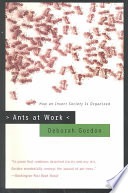
Deborah M. Gordon
Fellowship year
2001-02 - Stanford University - Study 36
1997-98 - Stanford University - Study 5
Faculty Fellow year
2021-22 - Stanford University
As a faculty fellow in 2021-22, Deborah M. Gordon will join the CASBS program “Humans, Nature, and Machines.” Gordon’s research is on collective behavior in ant colonies and other natural systems that operate without central control, using local interactions among participants to allow groups to respond to changing conditions. An ecological perspective on collective behavior examines how collective behavior adjusts to changing environments. Ant colonies function collectively, and the enormous diversity of more than 14K species of ants, in different habitats, provides opportunities to look for general ecological patterns in the evolution of collective behavior. Gordon’s long-term study of the demography and behavior of a population of colonies in New Mexico shows how natural selection is shaping the collective behavior that regulates foraging in response to water stress. Gordon is professor of biology at Stanford University. She is the author of Ants at Work (2000, W. W. Norton & Company), and Ant Encounters: Interaction Networks and Colony Behavior (2010, Princeton University Press, Primers in Complex Systems), both written during fellowships at CASBS, and a forthcoming book, The Ecology of Collective Behavior (Princeton University Press). Gordon was a CASBS fellow in 1997-98, 2001-02, and 2009-10. For more information, please visit her lab website: http://www.stanford.edu/~dmgordon/
Tyler Books
| Book Cover | Book Title and link |
|---|---|
 | Gordon, Deborah.. 1999. Ants at work :how an insect society is organized. New York: Free Press |
Tyler Journal Articles
Gordon, Deborah M.; Guetz, Adam; Greene, Michael J.; Holmes, Susan; . 2011. Colony variation in the collective regulation of foraging by harvester ants. 22(2): 429-435. https://doi.org/10.1093/beheco/arq218
Gordon, Deborah M.; . 2011. The fusion of behavioral ecology and ecology. 22(2): 225-230. https://doi.org/10.1093/beheco/arq172
Gordon, Deborah M.; . 2002. The regulation of foraging activity in red harvester ant colonies. 159(5): 509-518. https://doi.org/10.1086/339461
Volny, Veronica P.; Gordon, Deborah M.; . 2002. Genetic basis for queen-worker dimorphism in a social insect. 99(9): 6108-6111. http://www.pnas.org/content/99/9/6108.abstract
Human, Kathleen G.; Weiss, Stuart; Weiss, Andrew; Sandler, Bennet; Gordon, Deborah M.; . 1998. Effects of Abiotic Factors on the Distribution and Activity of the Invasive Argentine Ant (Hymenoptera: Formicidae). 27(4): 822-833. http://dx.doi.org/10.1093/ee/27.4.822
Wagner, Diane; Brown, Mark J.F.; Broun, Pierre; Cuevas, William; Moses, Lincoln E.; Chao, Dennis L.; Gordon, Deborah M.; . 1998. Task-related differences in the cuticular hydrocarbon composition of harvester ants, Pogonornyrmex barbatus. 24(12): 2021-2037. https://doi.org/10.1023/A:1020781508889
Wagner, Diane; Gordon, Deborah M.; . 1999. Colony age, neighborhood density and reproductive potential in harvester ants. 119(2): 175-182. https://doi.org/10.1007/s004420050774
